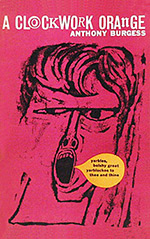
![]() BigEnk
BigEnk
11/21/2024
![]()
An excellent, short dystopian novel with a unique style and subsequent challenges. A Clockwork Orange follows a delinquent teen, Alex, and initially his three friends on their nighttime drug-induced tours of violence. The book is written from Alex's point of view and in English, but leans heavily on 'nadsat' slang, something that Burgess created out of Russian. This nadsat is what most teenagers use in A Clockwork Orange when addressing each other, a language that confuses the 'starry' (old) class of people. Much as it did for me, for awhile.
A lot of the meaning behind these words can be gleaned from the context clues that Burgess gives you, but it's still a steep learning curve at first. The usage of nadsat continues throughout the book, and rarely are actual definitions ever given. I think your enjoyment of A Clockwork Orange is largely dependent on your opinion of this slang language, and the graphic violence that Alex is fond of. Personally I found the nadsat to give the novel a fresh feeling despite it's age. Usually in these older SF novels, the author will include the slang of the period they are writing in, which at the time of publication might make the author seem less like an old fogy, but reading it 50 years later it typically makes the writing pointedly dated. Nadsat gives the world of A Clockwork Orange a unique and real feeling, something that I doubt will dissipate quickly.
The writing itself is typically long-winded in a semi-stream of consciousness style. I had mixed feelings about this, but I loved the structure of the plot itself and the repeated motifs within. I can see merits to both of the two 'ending' chapters (the copy I read included the final chapter that was omitted from the Kubrick film and many editions of the novel), though I think chapter six is a stronger finish to the novel, a resolution that also seems in line with the rest of the work.
A Clockwork Orange revolves mostly around the concept of free-will and choice. What does it mean to make someone 'good', especially if they have no choice to be 'bad'? Can there be rehabilitation through control? These are questions that Burgess doesn't answer directly, but leaves at the reader's feet for examination through Alex himself. There's also commentary on the prison system, government overreach, and police brutality to name a few. Burgess has things to say and doesn't pull any of his punches, which I respect.
It's a classic for a reason. I can see a lot of people disliking, or even hating it for its obsession with graphic violence or the writing style. Still, its a rare book that will illicit strong feelings to either end of the spectrum, and I find these types of works be the most interesting. It speaks to their memorability, their unique qualities that make them stand out of the crowd. A Clockwork Orange is memorable to the extreme, and I'm certain that the memory of reading it will have me back to the well at some point in the future. Interested in see the Kubrick film as well and see how it compares.